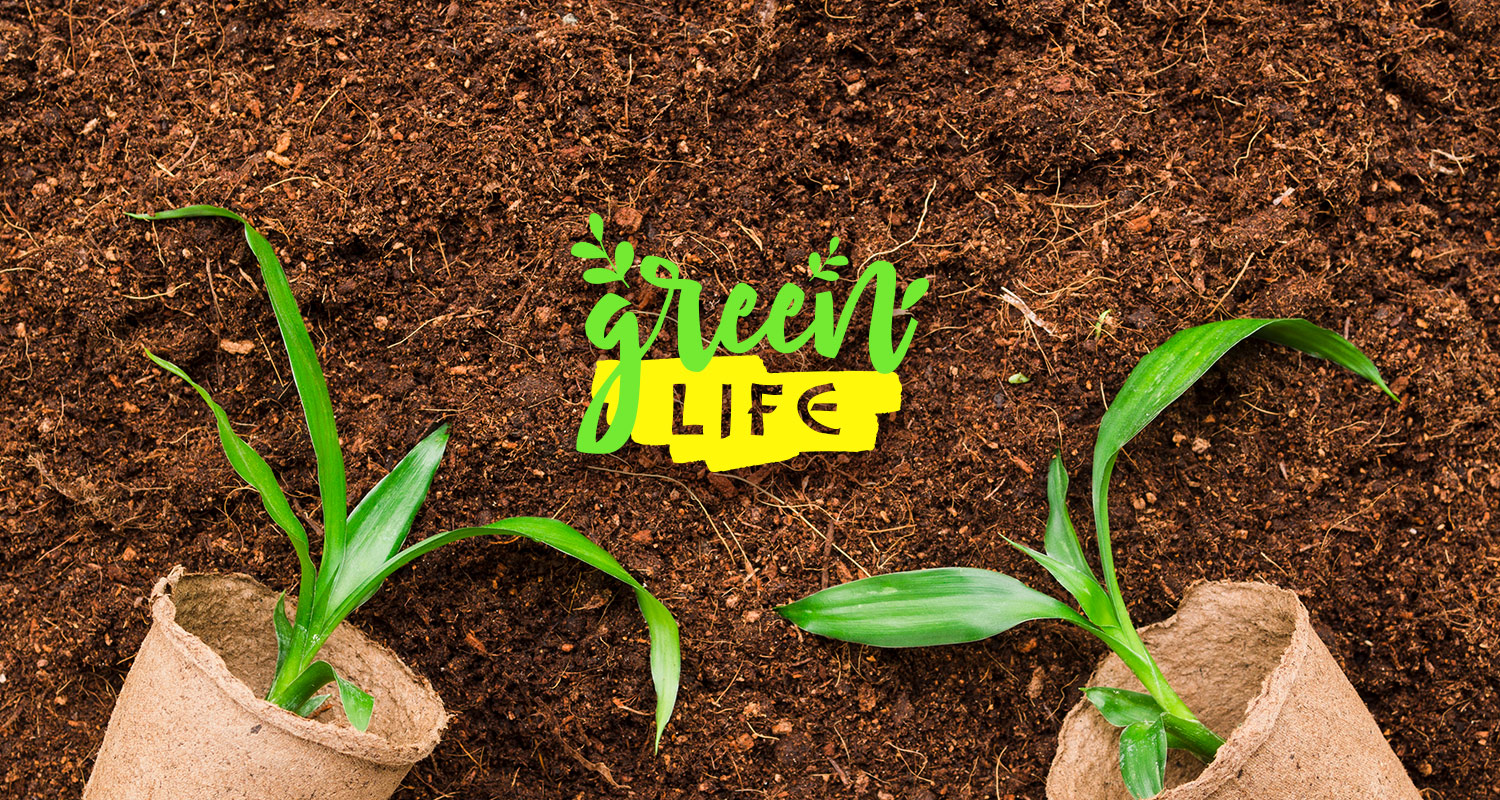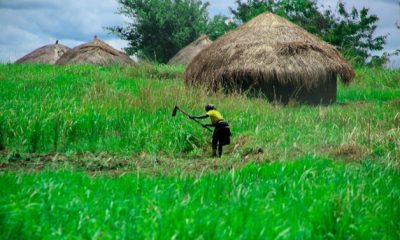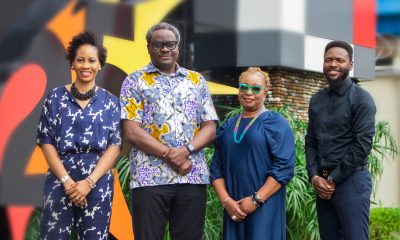NGOs - SDGs
Sahara Group Boots Climate Protection With Project #Greenlife

Lagos: June 21, 2019 – Are you living the #GreenLife? The answer to this question holds the key to the survival of almost 8 billion humans who reside on the planet that are faced with colossal environmental challenges. Regardless of the growing debates on how much danger climate change portends, or if it is merely some creation of doomsday prophets, Sahara Group believes a firm commitment to protecting our plant sustainably, should resonate with all who call Earth home.
Sahara Group’s commitment has inspired the adoption of the #GreenLife project which seeks to galvanise action towards tackling climate change through collaboration, recycling, capacity building, awareness raising as well as investment in clean, affordable and sustainable energy.
Climate change refers to any significant change in measures of climate, such as temperature, wind, and precipitation (rainfall and snow). These changes are caused by many factors including human activities like cutting down trees and burning fossil fuels that result in increased air pollution and greenhouse gas emissions. The effects of climate change can last for decades or longer.
“Climate Change is one of the most pivotal issues of our time and we are at a critical point. All across the world there are changes to our weather patterns that threaten food production, are leading to alarming rises in sea levels that pose the risk of life threatening and disastrous floods as well as soil erosion due to climate-induced flooding,” said Pearl Uzokwe, Sahara Group’s Director of Governance and Sustainability.
According to her, the situation would require immediate attention and a multi-faceted approach that “gives every occupant of planet earth a good shot at healthy living and the opportunity to create a healthier planet to sustainably support all forms of life.”
Uzokwe said Sahara Group’s #GreenLife project would involve recycling to promote a circular economy, upcycling, sustainable training, recycling for mother and child care, and access to clean energy initiatives.
“At Sahara Group, we have commenced an extensive recycling programme at our various offices as well as certain communities we operate within to drive environmental protection. We will be commencing with the recycling of paper, plastic and aluminum in our offices. Our aim is to promote a circular economy aimed at minimising waste and making the most of our resources. For environmental sustainability, the recycled waste collected will be converted into fibre, tissue paper and PET pellets for continued use.”
The Upcycling project will focus on the collection of discarded tyres creative remodelling into sustainable eco-friendly products such as ergonomically designed chairs for schools in the energy conglomerate’s host communities. The Joraf Gate school in Ijora, Lagos, Nigeria will be the first beneficiary of this upcycling project.
“In addition to spearheading the collection of materials for upcycling, Sahara Group, working in collaboration with several partners including Pearl Recycling will train indigenes of our host community in Ijora to upcycle waste products such as tyres and convert them into furniture, equip them with tools and set them on a path to sustainably train others in the community including students in a manner that helps tackle climate change whilst providing economic empowerment,” Uzokwe explained.
The Recycling for Mother and Child Care activity will focus on partnerships with healthcare providers and local community schools to offer maternal and child care in exchange for plastic collected by the beneficiaries. “Our primary focus will be on ensuring that the pupils at designated schools are given the option to offset the cost of all vaccinations up to the age of 5 and that mothers are offered credit to offset ante-natal care in exchange for plastic collected. We are hopeful that the pilot project in Nigeria will become a template for replicating other interventions across Africa.”
– Sahara Group
NGOs - SDGs
Mercy Ships and Mission Aviation Fellowship renew partnership to bring life-changing surgery to African patients

Mercy Ships and Mission Aviation Fellowship Team (Image: Supplied).
Humanitarian aid organizations Mercy Ships and Mission Aviation Fellowship (MAF) have renewed their partnership to help bring life-changing surgical care to isolated communities across Africa.
Mercy Ships operates state-of-the-art hospital ships, providing free surgeries and healthcare services to sub-Saharan nations with limited access to safe surgical care. MAF’s purpose is to bring help, hope and healing through aviation to people living in isolation and poverty.
The renewed memorandum of agreement between these two faith-based charities enables Mercy Ships to extend their reach further inland to a broader spectrum of the population across Africa, bolstered by MAF’s logistical support. This partnership, launched in Madagascar, will enable teams to access hard-to-reach areas and transport patients in need of critical surgical interventions. This collaboration provides opportunities for those in the most remote and inaccessible regions of the country. Further joint initiatives are being explored in other African nations.
“Traveling by road in Madagascar can be incredibly challenging due to the rough terrain and poor infrastructure,” Michael Jurgensen, MAF Madagascar Country Director, said. “In many cases, reaching remote villages can take days by car, draining valuable time and energy. However, with MAF Madagascar’s support, the [Mercy Ships] patient selection team can cover vast distances swiftly and safely, enabling them to visit multiple locations within a short period. Flying not only saves time for the selection team, but also ensures the team can travel to evaluate and select patients from the most isolated and underserved areas for surgery on-ship at a later date.
A 2016 study of Madagascar revealed that only 20% of the population can access surgical services within a two-hour timeframe, and up to 95% would face financial ruin if they required surgery (source: BMJ Global Health). With a scarcity of surgeons — approximately 1 for every 100,000 people — the prospect of receiving necessary surgical treatment seems unattainable for many (source: WHO).
Bernard van den Bosch, who has worked for both MAF and Mercy Ships, and current Director of the Africa Services Center at Mercy Ships, expressed his enthusiasm: “We are confidently re-engaging with MAF because together we are stronger. The country of Madagascar has many hard-to-reach areas, and MAF is the key to accessing them. Non-profit organizations can ‘compete,’ but ultimately, we all serve the same goal. I see many opportunities for future collaboration and intensive joint efforts.”
Bastiaan de Waal, Africa Regional Director of MAF, added: “By transporting Mercy Ships teams with our aircraft to the interior of Madagascar, we provide help, hope and healing to residents with the surgical care they desperately need. The need is high in these areas, and these people in isolated communities are equally entitled to care. We are pleased to partner alongside Mercy Ships to support this often-forgotten group. Being each other’s hand and foot is what we are called to do and we have a shared synergy of vision and values.”
This renewed collaboration between MAF and Mercy Ships exemplifies how strategic partnerships can enhance humanitarian efforts, ensuring that more people receive the critical medical care they need. The two organizations previously partnered from 2014 to 2016 in Madagascar and have worked together in Liberia.
Mercy Ships’ hospital ship, the Africa Mercy®, has been docked in Toamasina since February and is delivering surgery and training. The ship is actively collaborating with Madagascar’s Ministry of Health to identify the most pressing needs and strengthen the country’s surgical systems through its education, training, and advocacy program.
NGOs - SDGs
Climate Launchpad: Beyond competition, a catalyst for change

Climate Launchpad Competition 2023 Image.
Despite the success of The Climate Launchpad Competition 2023, Climate Launchpad through the support of Climate-KIC and Irish Aid provided additional support to the participants of the competition through the Post-Climate Launchpad Accelerator. Given that the majority of the participants are early-stage businesses, capacity building is a necessity. The post-competition support is divided into 2, The masterclasses that are being handled by the Climate Launchpad Global team which has participants from over 7 African countries, and The national capacity-building session handled by the Climate LaunchPad Nigeria Team.
The Masterclass session featured a business-changing session on important modules like funding options & Instruments, Gender and Climate, Communications and Storytelling, Climate Impact etc. The national capacity-building session focuses on marketing strategies, practical and optimal use of social media and analytics. As an early-stage business in Nigeria, one of the major challenges you face is reaching and communicating with your potential customers at the market entry stage. The modules were selected after feedback from alumni of the competition.
The modules have been proven to be useful as we have started seeing the tractions of the businesses on social media. Overall, the post-competition support program has been no short of helpful to the businesses. We had 5 active participants from Nigeria who have expressed their gratitude for the post-competition support. Each of them will be given a grant of EUR200 to facilitate their marketing and social media usage.
The National Lead for Climate Launchpad Nigeria, Oluwatosin Ajide affirms the importance of the accelerator program “If we have more competition dedicating their support beyond just the pitching like Climate Launchpad does, We would have more green businesses with solid foundations”. He also thanked the Climate Launchpad central team and the sponsors the Climate-KIC and Irish Aid for their constant support in building the green ecosystem in Nigeria.
NGOs - SDGs
GEANCO Foundation and Archewell Foundation Announce Mental Health Initiative for Nigerian Youth

The GEANCO Foundation and The Archewell Foundation has announced an expansion of their partnership, currently serving girls and young women across Nigeria with menstrual health products and education, to include mental health resources and training for young men and women.
This expanded partnership kicked off with its inaugural Mental Health Summit, taking place over two days and serving nearly 200 students in Abuja, Nigeria’s capital. Prince Harry and Meghan, The Duke and Duchess of Sussex and co-Founders of The Archewell Foundation opened the Summit by delivering inspiring remarks to the young people in attendance.
GEANCO intends to hold summits throughout the country over the next year, providing teenage girls and boys with the information, skills, and coping mechanisms necessary to flourish mentally.
“Youth in Nigeria are critically underserved in terms of mental and menstrual health”, said GEANCO’s CEO Afam Onyema. “I am deeply grateful to The Duke and Duchess for partnering with us to address this crisis and provide this vulnerable but inspiring young generation with what they need to thrive in body, mind and spirit.”
A strong stigma also surrounds mental health in Nigeria, which is critically neglected in the country. The World Health Organization estimates that only 3% of the federal government’s health budget goes to mental health, and while up to one-third of Nigerians have mental health challenges, fewer than 500 mental health professionals serve the country’s 200 million plus citizens. Nigeria’s teens and youth in particular have little to no access to mental health support.
The expanded partnership will also continue the ongoing work to support young girls with menstrual health products and education. An estimated 37 million women and girls in Nigeria experience “period poverty”, meaning they are unable to access or afford menstrual products like pads, tampons, and underwear. Because of the material difficulties caused by period poverty and the deep stigma surrounding menstruation, millions of girls in the country miss school every month, crippling their educational advancement and deepening Nigeria’s already vast levels of gender inequality.
GEANCO Foundation provides critical health care and education services in Nigeria. Its David Oyelowo Leadership Scholarship provides full tuition, medical care, and social and emotional support to young female victims of terrorism and gender inequality in Nigeria.
-

 Afripreneur13 hours ago
Afripreneur13 hours agoRedefining Real Estate Marketing: An Interview with Imelda Usoro Olaoye, Founder of Thinkmint
-

 Afripreneur12 hours ago
Afripreneur12 hours agoOluchi Anoruo on building SmartPharm and addressing access to healthcare products
-

 Economy17 hours ago
Economy17 hours agoMeta Hosts its First Youth Summit in Nigeria to Drive Innovation and Empowerment
-

 Technology17 hours ago
Technology17 hours agoLG’s Brand Reinvention: A Global Success Story

















